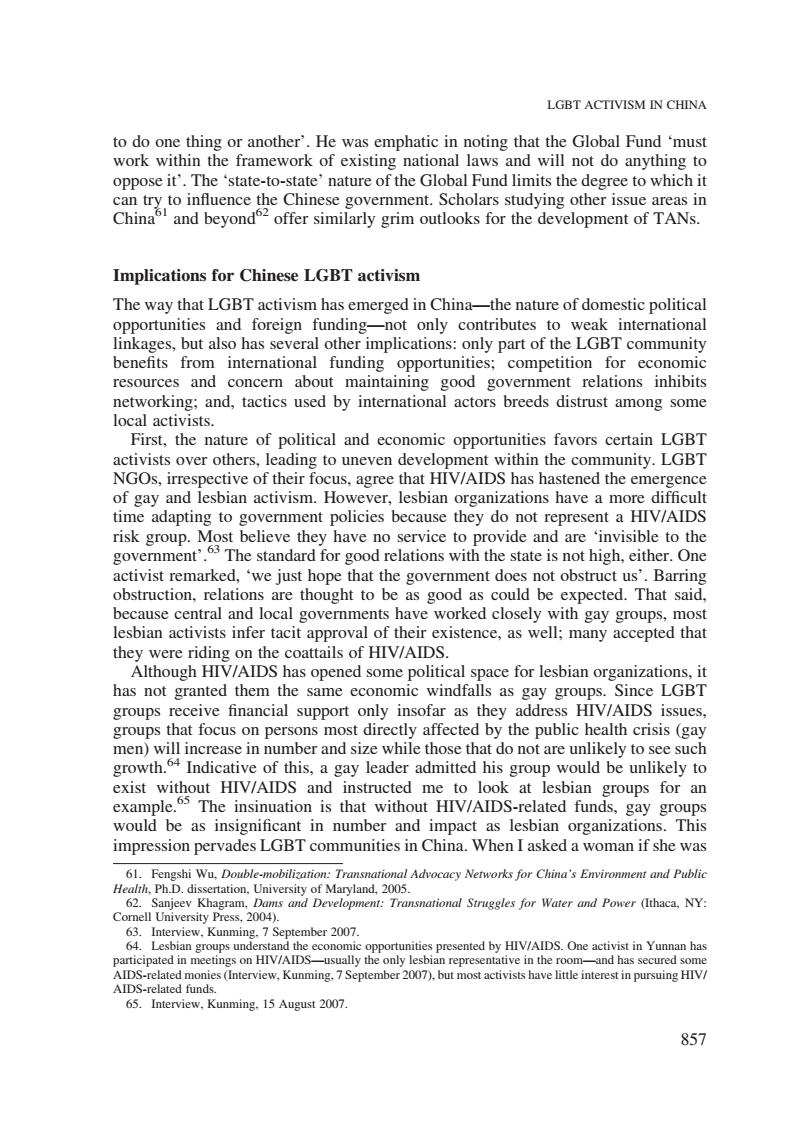正在加载图片...

LGBT ACTIVISM IN CHINA to do one thing or another'.He was emphatic in noting that the Global Fund 'must work within the framework of existing national laws and will not do anything to oppose it'.The 'state-to-state'nature of the Global Fund limits the degree to which it can try to influence the Chinese government.Scholars studying other issue areas in China and beyond2 offer similarly grim outlooks for the development of TANs. Implications for Chinese LGBT activism The way that LGBT activism has emerged in China-the nature of domestic political opportunities and foreign funding-not only contributes to weak international linkages,but also has several other implications:only part of the LGBT community benefits from international funding opportunities;competition for economic resources and concern about maintaining good government relations inhibits networking;and,tactics used by international actors breeds distrust among some local activists. First,the nature of political and economic opportunities favors certain LGBT activists over others,leading to uneven development within the community.LGBT NGOs,irrespective of their focus,agree that HIV/AIDS has hastened the emergence of gay and lesbian activism.However,lesbian organizations have a more difficult time adapting to government policies because they do not represent a HIV/AIDS risk group.Most believe they have no service to provide and are 'invisible to the government'The standard for good relations with the state is not high,either.One activist remarked,'we just hope that the government does not obstruct us'.Barring obstruction,relations are thought to be as good as could be expected.That said, because central and local governments have worked closely with gay groups,most lesbian activists infer tacit approval of their existence,as well;many accepted that they were riding on the coattails of HIV/AIDS. Although HIV/AIDS has opened some political space for lesbian organizations,it has not granted them the same economic windfalls as gay groups.Since LGBT groups receive financial support only insofar as they address HIV/AIDS issues, groups that focus on persons most directly affected by the public health crisis(gay men)will increase in number and size while those that do not are unlikely to see such growth.64 Indicative of this,a gay leader admitted his group would be unlikely to exist without HIV/AIDS and instructed me to look at lesbian groups for an example.65 The insinuation is that without HIV/AIDS-related funds,gay groups would be as insignificant in number and impact as lesbian organizations.This impression pervades LGBT communities in China.When I asked a woman if she was 61.Fengshi Wu.Double-mobilization:Transnational Advocacy Networks for China's Environment and Public Health,Ph.D.dissertation,University of Maryland,2005. 62.Sanjeev Khagram.Dams and Development:Transnational Struggles for Water and Power (Ithaca,NY: Cornell University Press,2004). 63.Interview.Kunming.7 September 2007. 64.Lesbian groups understand the economic opportunities presented by HIV/AIDS.One activist in Yunnan has participated in meetings on HIV/AIDS-usually the only lesbian representative in the room-and has secured some AIDS-related monies(Interview,Kunming,7 September 2007),but most activists have little interest in pursuing HIV/ AIDS-related funds. 65.Interview.Kunming.15 August 2007 857to do one thing or another’. He was emphatic in noting that the Global Fund ‘must work within the framework of existing national laws and will not do anything to oppose it’. The ‘state-to-state’ nature of the Global Fund limits the degree to which it can try to influence the Chinese government. Scholars studying other issue areas in China61 and beyond62 offer similarly grim outlooks for the development of TANs. Implications for Chinese LGBT activism The way that LGBT activism has emerged in China—the nature of domestic political opportunities and foreign funding—not only contributes to weak international linkages, but also has several other implications: only part of the LGBT community benefits from international funding opportunities; competition for economic resources and concern about maintaining good government relations inhibits networking; and, tactics used by international actors breeds distrust among some local activists. First, the nature of political and economic opportunities favors certain LGBT activists over others, leading to uneven development within the community. LGBT NGOs, irrespective of their focus, agree that HIV/AIDS has hastened the emergence of gay and lesbian activism. However, lesbian organizations have a more difficult time adapting to government policies because they do not represent a HIV/AIDS risk group. Most believe they have no service to provide and are ‘invisible to the government’.63 The standard for good relations with the state is not high, either. One activist remarked, ‘we just hope that the government does not obstruct us’. Barring obstruction, relations are thought to be as good as could be expected. That said, because central and local governments have worked closely with gay groups, most lesbian activists infer tacit approval of their existence, as well; many accepted that they were riding on the coattails of HIV/AIDS. Although HIV/AIDS has opened some political space for lesbian organizations, it has not granted them the same economic windfalls as gay groups. Since LGBT groups receive financial support only insofar as they address HIV/AIDS issues, groups that focus on persons most directly affected by the public health crisis (gay men) will increase in number and size while those that do not are unlikely to see such growth.64 Indicative of this, a gay leader admitted his group would be unlikely to exist without HIV/AIDS and instructed me to look at lesbian groups for an example.65 The insinuation is that without HIV/AIDS-related funds, gay groups would be as insignificant in number and impact as lesbian organizations. This impression pervades LGBT communities in China. When I asked a woman if she was 61. Fengshi Wu, Double-mobilization: Transnational Advocacy Networks for China’s Environment and Public Health, Ph.D. dissertation, University of Maryland, 2005. 62. Sanjeev Khagram, Dams and Development: Transnational Struggles for Water and Power (Ithaca, NY: Cornell University Press, 2004). 63. Interview, Kunming, 7 September 2007. 64. Lesbian groups understand the economic opportunities presented by HIV/AIDS. One activist in Yunnan has participated in meetings on HIV/AIDS—usually the only lesbian representative in the room—and has secured some AIDS-related monies (Interview, Kunming, 7 September 2007), but most activists have little interest in pursuing HIV/ AIDS-related funds. 65. Interview, Kunming, 15 August 2007. LGBT ACTIVISM IN CHINA 857